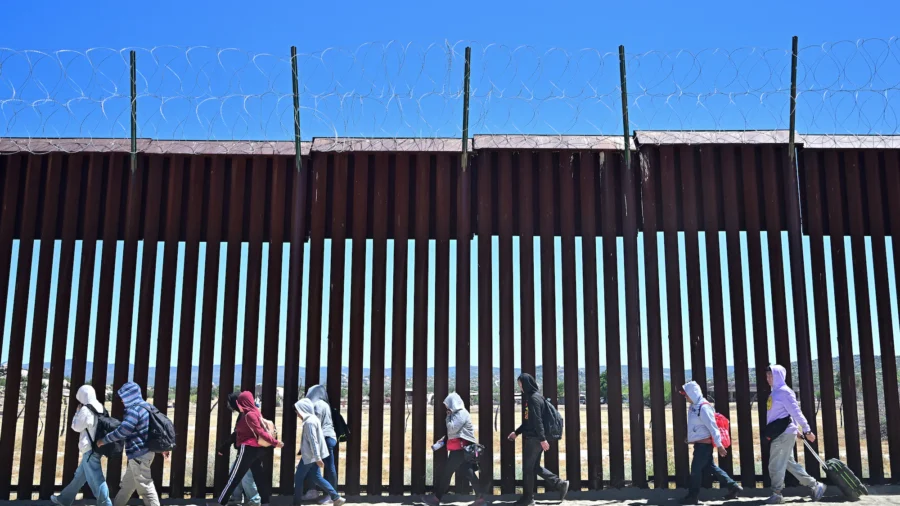Border Patrol apprehended 56,408 illegal immigrants at the U.S. southern border in July, Customs and Border Protection (CBP) said on Friday.
An additional 47,700 inadmissible immigrants presented themselves at ports of entry, driving the total number of entrants without legal documentation at the southern border to 104,100.
CBP said July marked the lowest monthly total of illegal immigrant encounters since September 2020.
According to CBP data, in September 2020, Border Patrol apprehended 54,771 illegal immigrants between ports of entry on the U.S.–Mexico border, while an additional 2,903 inadmissible aliens presented at ports of entry, for a total of 57,674.
CBP’s latest data for July show a 32 percent drop in Border Patrol apprehensions compared to June.
CBP attributed the July decline to a proclamation signed by President Joe Biden in June, which bars those who cross the border illegally from applying for asylum in the United States once a threshold of 2,500 per day for seven consecutive days is reached.
“In July, our border security measures enhanced our ability to deliver consequences for illegal entry—leading to the lowest number of encounters along the southwest border in more than three years,” Troy Miller, acting CBP commissioner, said in a statement.
After Biden signed the proclamation on June 4, encounters at the border have decreased by 55 percent, with more than 92,000 illegal immigrants removed or returned to their home countries, according to the CBP.
Between June and July, the number of unaccompanied children crossing the border decreased by 15 percent; single adults declined by 27 percent; and family unit individuals fell 24 percent, CBP said.
CBP processed more than 38,000 individuals who used the CBP One app to schedule appointments at ports of entry last month, bringing the total to more than 765,000 since the app was introduced in January 2023.
Miller said the agency is working with international partners to target transnational criminal organizations involved in human smuggling. He said CBP has also enhanced enforcement efforts against illicit fentanyl.
“These efforts are seeing results, as CBP saw the largest fentanyl seizure in our agency’s history just a few weeks ago. We remain vigilant in these efforts alongside our partners,” he said.
Biden has said the asylum restrictions will remain in place until the number of people trying to enter the country illegally is “reduced to a level that our system can effectively manage.”
CBP One App, Parole Program
House Committee on Homeland Security Chairman Mark Green (R-Tenn.) blamed the Biden administration for the surge in illegal border crossings, which he said has now surpassed 10 million.
The federal government is “encouraging otherwise-inadmissible aliens to cross at ports of entry instead of between them—thereby creating a façade of improved optics for the administration, but in reality imposing a growing burden on our communities,” Green said in a statement.
Green said that illegal immigrant encounters at U.S. ports of entry—land, sea, and air—were “up exponentially” this fiscal year compared to 2021, with more than 1.38 million “inadmissible aliens” being granted entry into the country since January 2023.
That number includes 765,000 people admitted through the CBP One app and 520,000 migrants granted entry through the government’s CHNV parole program for Cubans, Haitians, Nicaraguans, and Venezuelans.
“Even if another illegal alien did not cross our Southwest border for the remainder of Biden–Harris’ term, the millions they have already allowed into our country have done damage that will take decades to remedy,” Green stated.
Earlier this month, the Department of Homeland Security (DHS) said it had temporarily paused travel authorizations for CHNV parolees after an internal report found “massive fraud” in its application process.
The program allows up to 30,000 migrants from each of the four countries into the United States each month, provided they meet certain conditions, including having a sponsor in the United States who will provide them financial support.
The pause was initiated after an internal report by U.S. Citizenship and Immigration Services (USCIS) found the use of fraudulent information in thousands of application forms filed by sponsors. The report was obtained by the Federation for American Immigration Reform.

